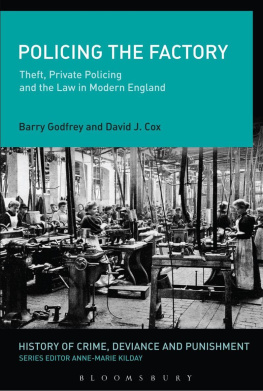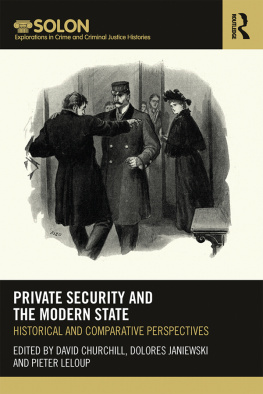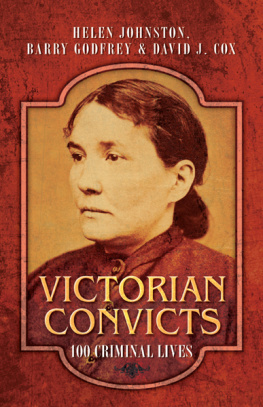Policing the Factory
History of Crime, Deviance and Punishment series
Series Editor: Anne-Marie Kilday, Professor of Criminal History, Oxford Brookes University, UK
Academic interest in the history of crime and punishment has never been greater and the History of Crime, Deviance and Punishment series provides a home for the wealth of new research being produced. Individual volumes within the series cover topics related to the history of crime and punishment, from the later medieval to modern period and in both Europe and North America, and seek to demonstrate the importance of this subject in furthering understanding of the way in which various societies and cultures operate. When taken together, the works in the series will show the evolution of the nature of illegality and attitudes towards its perpetration over time and will offer their readers a rounded and coherent history of crime and punishment through the centuries. The series broad chronological and geographical coverage encourages comparative historical analysis of crime history between countries and cultures.
Other Forthcoming Titles in the Series:
Deviance, Disorder and Music in Modern Britain and America , Cliff Williamson
The Forefathers of Terrorism , Johannes Dillinger
Policing the Factory
Theft, Private Policing and the Law in Modern England
Barry Godfrey and David J. Cox
Bloomsbury Academic
An imprint of Bloomsbury Publishing Plc
50 Bedford Square | 175 Fifth Avenue |
London | New York |
WC1B 3DP | NY 10010 |
UK | USA |
www.bloomsbury.com
First published 2013
Barry Godfrey & David J. Cox, 2013
All rights reserved. No part of this publication may be reproduced or transmitted in any form or by any means, electronic or mechanical, including photocopying, recording, or any information storage or retrieval system, without prior permission in writing from the publishers.
Barry Godfrey and David J. Cox have asserted their rights under the Copyright, Designs and Patents Act, 1988, to be identified as Authors of this work.
No responsibility for loss caused to any individual or organization acting on or refraining from action as a result of the material in this publication can be accepted by Bloomsbury Academic or the author.
British Library Cataloguing-in-Publication Data
A catalogue record for this book is available from the British Library.
ePub ISBN: 978-1-4411-7688-2
Library of Congress Cataloging-in-Publication Data
A catalog record for this title is available from the Library of Congress.
Typeset by Deanta Global Publishing Services, Chennai, India
Contents
Our interest in issues of private policing has developed over a long time, and we have accumulated a large intellectual debt over that time. This work originated as a PhD thesis under the supervision of Professor Peter King, a superb guide and ally in the quest to develop historical knowledge on crime and policing, as well as a great person to discuss all manner of ideas (historical, political, football...). Subsequently, we have learnt a great deal from academics working in the fields of police history, as well as postgraduate students past and present. In developing theories around the legal governance of private space and the relationship between labour and capital we have formed a happy coalition founded on differing areas of knowledge Davids research on entrepreneurial and public policing in the eighteenth and early nineteenth century, and Barrys research on workplace crime in the textile regions of the nineteenth century. We hope that our joint efforts have strengthened our work which would not exist without the work of the archivists in various West Yorkshire repositories who cheerfully provided huge dusty-covered quarter sessions records, and huge very heavy volumes of Directors minute books. We would like to thank them, and all the other un-named but important people who have contributed to our thoughts and to our work, printed here.
Barry Godfrey and David J. Cox
August 2012
The study of workplace appropriation and its policing offers windows in to many important historical concerns. Strangely, however, the vast majority of historians working on this topic have either focused on the eighteenth century or on the twentieth, and on areas peripheral to the fundamental regional transformations that formed the core of the industrialization process. The publication of a study centred on one of the heartlands of the industrial revolution and on the century in which that process, whatever we might wished to call it, transformed many aspects of economic and social relations in Britain is therefore immensely welcome. The focus of many of the first generation of social historians that studied crime and customary rights on the pre-1800 period left a very considerable hole in the following century, and the conclusion of some of those authors that the eighteenth century witnessed a clear custom to crime transition also seems to have led to the subject being much less well served by historians of the Victorian period. That transition was not, however, as clear cut as historians such as Peter Linebaugh chose to believe, and the continued battles over workplace appropriation in the nineteenth and twentieth centuries are an important testing ground for grand theories about the rise of the policeman state and the about the extent to which more general structures of power and discipline were effective in the journey to modernity. In many contexts, and particularly in industrial locations such as the factory, we still know far too little about the nature of the normative orderings and sanctioning systems that actually constituted discipline in this context. Workers showed a remarkable reluctance to keel over in the face of these new disciplinary agendas and we need to know much more about the array of sanctions available, about their depth of penetration, about the policing practices and resources (formal and informal), that supported them, about the modes in which they were subverted or overtly opposed, and about the compromises that emerged from the interplay of imposition and opposition.
The immensely discretionary nature of the practices found in the courts, the problems of defining what the law was, and the complex and often flatly contradictory legal principles which seem to be embodied in the black letter law was the subject of much debate, and considerable criticism, when legal reformers attempted the task of systematising the criminal law in the second quarter of the nineteenth century. Historians have recently debated both the extent to which law was remade on the ground in the eighteenth and nineteenth centuries and (most notably in the heated debate between Bruce Smith and Norma Landau in the Law and History Review ) the degree to which certain legal structures including some of the laws related to the woollen industry undermined (and indeed flatly contradicted) contemporary rhetoric about the presumption of innocence. In the process, they have emphasized once again the vital importance of moving below the jury court records of the quarter sessions and assizes to study the petty sessions records, for this is where the vast majority of cases including cases involving the appropriation of materials used in the woollen industry were heard. While historians have rightly emphasized that the law and the summary courts themselves were used by all social groups in the eighteenth and nineteenth centuries this does not mean that, particularly at the more informal level of the justices parlour or the petty sessions meeting, it could not be use strategically and effectively by employers to control their workers.





